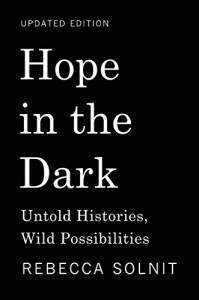
Rebecca Solnit
Hope in the Dark: Untold Histories, Wild Possibilities
(Haymarket Books, March 2016)
The Indypendent on Hope in the Dark
Rebecca Solnit on living in dark times for the Guardian
Marginalia, a Los Angeles Review of Books Channel, on Hope in the Dark
On New York Magazine‘s list of “6 Books Our Political Writers Are Reaching for Right Now”
A book as powerful and influential as Rebecca Solnit’s Men Explain Things to Me, Hope in the Dark was written to counter the despair of radicals at a moment when they were focused on their losses and had turned their back to the victories behind them—and the unimaginable changes soon to come. In it, she makes a radical case for hope as a commitment to act in a world whose future remains uncertain and unknowable. Drawing on her decades of activism and a wide reading of environmental, cultural, and political history, Solnit argued that radicals have a long, neglected history of transformative victories, that the positive consequences of our acts are not always immediately seen, directly knowable, or even measurable, and that pessimism and despair rest on an unwarranted confidence about what is going to happen next.
Now, with a moving new introduction explaining how the book came about and a new afterword that helps teach us how to hope and act in our unnerving world, she brings a new illumination to the darkness of 2016 in an unforgettable new edition of this classic book.
Praise for Hope in the Dark
“People want to see an end to war, environmental destruction and political corruption. Increasingly, they are convinced that major changes to the status quo are necessary, and they are building movements to bring about those changes. That’s why I’m grateful for the bravery and optimism of people like Amy Goodman and Rebecca Solnit, who aren’t afraid to celebrate the progress these movements have made, even when there’s still more work to do.”
–Beatrix Lockwood, The Indypendent
“Lately, I’ve been looking for books that both recognize a turgid, doubtful state of mind and (somehow) make it seem possible that one’s own doubtful turgidity can turn into something strong and beautiful and good. Those have been “Look,” by Solmaz Sharif, a restless, gorgeous book of poetry that uses the United States Department of Defense military dictionary as an internal structure; “The Correspondence,” by J. D. Daniels, which is dark and funny and contains sentences like “My face looked like a sandwich someone had already eaten”; and, like a lot of people, “Hope in the Dark,” by Rebecca Solnit, an elegant reminder that activist victories are easily forgotten, and that they often come in extremely unexpected, roundabout ways.”
–Jia Tolentino, The New Yorker
“Hope in the Dark, written for activists, shows us what can be done, politically, even when progress seems impossible and continuing the fight exhausting. These lessons will matter enormously in the months ahead as the pandemic gives way to the fight about what kind of society will be erected in its aftermath. But they also offer deep comfort now, as antidotes not just to feelings of helplessness but loneliness.”
—David Wallace-Wells in New York Magazine
Rebecca Solnit is the author of sixteen books about environment, landscape, community, art, politics, hope, and memory, including Men Explain Things to Me, The Faraway Nearby, A Paradise Built in Hell: The Extraordinary Communities that Arise in Disaster, A Field Guide to Getting Lost, and Wanderlust: A History of Walking, as well as the recipient of many awards, including the Lannan Literary Award and the National Book Critics Circle Award.
